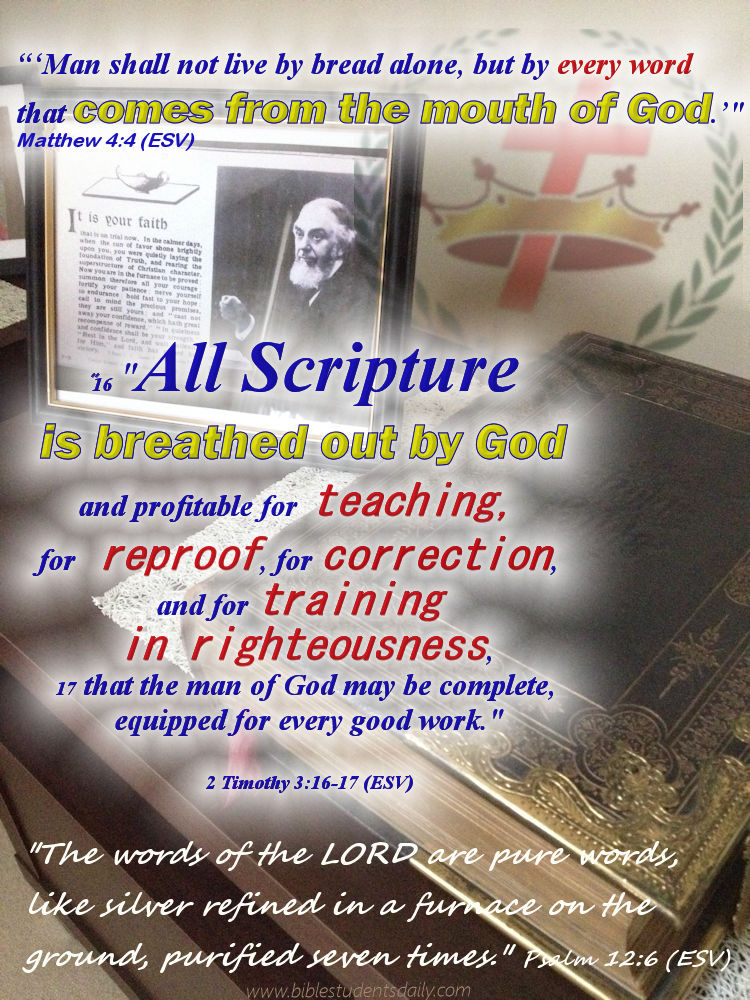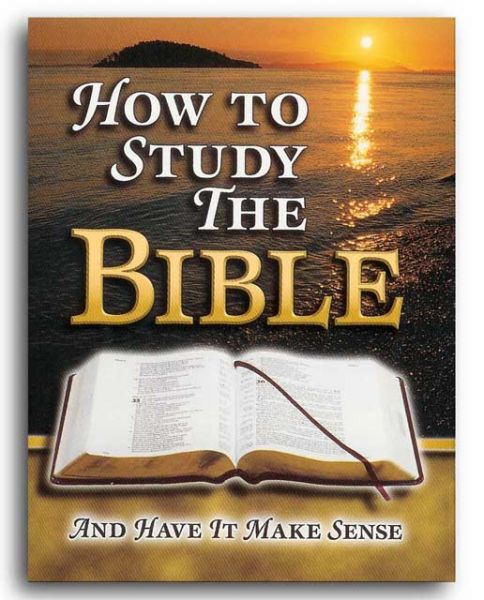
“The more we feed our mind with anything in one direction, the more it will wander there. Let us feed our mind with good spiritual food and have it wander in the right direction” (Pastor Charles T. Russell, “What Pastor Russell Said,” page 159).
There is a saying “the grass is always greener on the other side.” It is like this with our natural dispositions—that whatever is “a little piece off” from us we are inclined to want, perhaps like a cow in a paddock who is fed the best grass in her own barn, but when beside the neighbour’s fence, she will try to break through the fence to get to the neighbour’s paddock of grass! But what happens then?! Let the following picture and the Scriptural admonitions on it do the explaining!

Dear friends, we want to fence ourselves off from the world that we will no longer desire those things, and as the Apostle says, “set our affection on things above and not on things beneath” (Colossians 3:2).
This word “set” suggests a continual setting. Set it today, and tomorrow morning set it early, and if it slips off, set it back again. If it slips off set it back again, and by and by we will be too busy to have time to wander.
Let us not become overcharged with the affairs of this life by very trifling things, things that are not worthy of our attention at all, but foolishness. Let us not give our mind to what another person imagines and made a story about, such as secular entertainment often is. In the Bible we have the most wonderful story, the most wonderful drama that was ever known.
The Bible could be said to have the best plot that any novel ever had or will have. It goes all the way back to the beginning of Creation and shows the garden of Eden in all its beauty and grandeur, then the coming in of the serpent and the temptation of our first parents. Mother Eve was deceived and father Adam, being perplexed, gave his very life for his wife, because he thought he could never live without her. Thus he proceeded against God’s command. He ate fruit from the tree of the knowledge of good and evil in the midst of the Garden of Eden (Genesis 2:9, 17).
A river watering the garden flowed from Eden, a name that means “pleasure” (Strong’s 5730), and separated upstream into four contributing headwaters (Genesis 2:10-14):
- Pishon—meaning “increase” (Strongs 6376);
- Gihon—meaning “bursting forth” (Strongs 1521);
- Tigris (or Hidekel)—meaning “rapid” (Strongs 2313);
- Euphrates—meaning “fruitful” (Strongs 6578).
This river of Eden may represent the “river of water of life” that flows from the throne of God to bless mankind (Revelation 22:1). That river of life is the Gospel, or good news, of salvation through Christ. The life and work of Christ comes to us in four Gospel Accounts, that may be represented by the four headwaters contributing to the river of Eden.
Perhaps also, the four headwaters may somewhat reflect the four categories of humanity during the 1000 year millennial reign of Christ as is reflected in the four divisions of the Levitical priesthood, (explained in the post titled: “Study 6: The Levites”) whereby:
- The Pishon river that flowed around the whole land of Havilah, where there is gold (Genesis 2:11) reflects the Amram Levites, who were situated on the eastern side of the Tabernacle and may represent the antitypical “Little Flock” and BRIDE OF CHRIST.
- The Gihon river reflects the Merari Levites who were situated on the northern side of the tabernacle who “burst forth” in service to the Heavenly Father. The Gihon river flows through south-eastern Mesopotamia into Ethiopia – which from time immemorial has been a symbol of servitude so would represent the SERVANTS class before the throne in heaven, the palm-bearers of Revelation who were also of the spirit-begotten class and “called out of Babylon” class—the “great multitude” class. These do not qualify as the Bride of Christ yet are a heavenly class “before the throne” (Revelation 7:15) who “burst forth” with joy in serving the Heavenly Father and The Christ—head and body, who shall then be complete in full glory.
- The Tigris (Hidekel) River means “rapid” and it may reflect the Kohathite Levites who represent the Ancient Worthies who will be the “princes on earth” helping humanity make rapid progress by their work on earth to “rapidly” spread the Truth about righteousness and the need to obey God’s law of love in order to inherit eternal life.
- The Euphrates River – reflects the world of mankind in the kingdom as reflected in the typical picture of the Gershom Levites on the Western side of the Tabernacle arrangement of Israel in the wilderness, who shall be fruitful in the 1000-year Millennium as they walk up the “highway of holiness” to gain eternal life choosing obedience to Godly principles.
The Plot Thickens
Then we learn about what disastrous effects of sin have come into the world as the result of Adamic disobedience. We could not have any deeper plot than to think how the Adversary and the fallen angels have conspired to blind and delude men and women from Eden to now.
The picture then reveals our great Creator looking down from His holy habitation, beholding our condition in sin and degradation, hearing the groaning of the prisoners, all going down to the prison house of death.
Can we find any novel more engaging than that?
Only God can help man out of his trouble. No power but God’s can open the bars of the prison‑house of death and bring the prisoners out. Only by choosing to obey God will life eternal, and eternal happiness, result.
God’s eye pitied us, and He extended his Arm to help us, in the person of his son, Jesus, who as our redeemer gave his life a RANSOM FOR ALL.
We read about Jesus redemptive gift toward every single human that ever lived, in 1 Timothy 2:6,
“Who gave himself a ransom for all, to be testified in due time.”
Jesus Christ died the just for the unjust and thus satisfies justice. When the proper time comes for the Millennial Reign of Christ with his Bride class, then mankind will be released from the curse. This will occur, by God’s grace, after the sharers in the anti-typical “sin offering” shall have fulfilled their covenant of sacrifice until death and become the completed Bride of Christ united with their Head, Christ Jesus. Thereafter, the living among mankind who embrace the Kingdom can begin walking up the Highway of Holiness, without passing through the death experience. For the curse will be abated. Subsequently, those raised from the dead will also be invited to walk up that Highway to perfection, if they will (Isaiah chapter 35).
This grand novel provides still more!
What kind of Bride will the Heavenly Father have his Son to possess? She has only the filthy rags of sin and imperfection, yet she desires to be in harmony with God’s will. So Christ, her Bridegroom, provides for her purification, cleansing, and justification. He even provides her a wedding garment.
Is this not a great plot?
Now, what must the Bride do? She must receive this robe of Christ’s righteousness which is to be the wedding garment. A marriage is preparing, and the bride must get ready by getting a robe from the bridegroom.
Then what shall the Bride do with this robe?
She must embroider it. She gets the robe for nothing and has the stamped pattern given to her.
What pattern?
Christ is the pattern and she must do the embroidery work herself. She must work out her own salvation “with fear and trembling” (Philippians 2:12), seeing carefully that every stitch on the robe shall conform to the pattern the Lord has given her.
What does the embroidery represent?
It represents the fruits and graces of the holy Spirit. We know that unless we have those fruits and graces, we will never be counted worthy to be a joint‑heir in the Kingdom.
What are the fruits and graces of the holy Spirit?
“The fruit of the Spirit is love, joy, peace, patience, kindness, goodness, faithfulness, gentleness, self‑control; against such things there is no law” (Galatians 5:22‑23).
How long does it take to embroider these?
It takes longer with some and shorter with others. Some can get their hearts fixed on this glorious pattern (Hebrews 12:2) and so appreciate it that it is the great desire of their lives to cultivate these graces of the holy Spirit. As they go to the Lord, the first thing in the morning they say, Lord help me to cultivate the fruits of Thy spirit today.
Why?
Because I want to be pleasing to the Bridegroom, and be ready when he claims his Bride, that I may be counted worthy to enter in as a member of that Bride class (2 Thessalonians 1:4-5). Then all the trials and difficulties we are obliged to pass through, will be finished. He allows us to be tempted in all points like He was tempted.
“14 Since then we have a great high priest who has passed through the heavens, Jesus, the Son of God, let us hold fast our confession. 15 For we do not have a high priest who is unable to sympathize with our weaknesses, but one who in every respect has been tempted as we are, yet without sin. 16 Let us then with confidence draw near to the throne of grace, that we may receive mercy and find grace to help in time of need” (Hebrews 4:14-16).
Why?
Because He wants to have a Bride class who can endure temptation, endure hardness, show loyalty, and manifest that they are not merely so‑so Christians, but really overcomers, seeking to know and to do God’s will. He wants them to love righteousness and truth so that they would lay down their lives in this service, rather than receive the pleasures of sin for a time. He has taken nearly 2000 years so far, for this purpose.
God knew there would not be very many who would love Christ sufficiently to lay down their life in sacrifice with Christ, in difficult circumstances, and thus receive the reward of incorruption and immortality with Christ. Every one of the Bride members will be approved of the Father. Christ will present them blameless and unreprovable before God in love, after they have had all of the necessary trials that permit their share in the blessings (which come from the sufferings for righteousness sake) of Christ.
The invitation
Christ invites whom he will, and marks them with the holy Spirit of God. This mark indicates who has been invited to run in the race “toward the mark for the prize of the high calling of God in Christ Jesus” (Philippians 3:14). They are called out of Babylon (Revelation 18:4) and enlisted in a “beauty contest,” like Queen Esther.
It is a beauty contest pertaining to one’s Christlikeness. The criteria are based upon a character of godliness and righteous conduct, reflecting loyalty, trustworthiness, and obedience to God’s will. The overcomers will constitute a loyal Bride of Christ forever.
This “calling out” or “marking” with the holy Spirit of God allows them to understand His Divine plan and character. This is part of the betrothal process. We are engaged to Christ now and everything depends upon our developing proper Christian character, upon wearing our robe, and upon showing our love and zeal by the embroidering our robe with the fruits and graces of the spirit.
Then what?
Then comes the marriage of the Lamb when the Bride has made herself ready.
What is the marriage all about between Christ and His “little flock”?
The marriage will be our collective union with the Lord.
How will it be brought about?
By the change from imperfect human nature to Divine nature—“changed in a moment, in the twinkling of an eye” (1 Corinthians 15:52). Then we are to be forever with the Lord.
And is there a supper, or something?
Yes, or we might call it a breakfast, as it is in the morning. The word “supper” comes from the terms “to sup.” You may sup in the morning, noon or evening. It means to eat. This supper is to be the first great banquet that we will have on the other side of the vail.
Who could ever imagine that such a most wonderful drama is found in the Bible?
And what next?
Well, before the supper begins they will wait a little while for the Bridesmaids, comprising a secondary company. They were part of the church at one time; they made a consecration and were begotten of the holy Spirit, just the same as the Bride class, but they failed to make their calling and election sure to the high position to which they were invited. They were not sufficiently zealous and loyal.
Were they disloyal?
Oh, No! No disloyal ones will be given anything at God’s hands. By and by they will come up through great tribulation and wash their robes and make them white in the blood of the Lamb, and be before the throne instead of on the throne. They will have palms of victory instead of crowns of glory.
So we read in Psalms that after Jesus, the King, shall introduce the Bride before the Father, then the virgins, her companions that followed after her, shall also be brought into the presence of the King (Psalms 45:14). Oh, there is a grand drama there in all that Bible picture!
Then have we anything more? Yes, the King and Queen are going to reign for a thousand years, and everybody is going to be blessed. In all that empire there will be no attempt to take from the people their rights, and make everything subservient to the King, and the people poor. The very reverse of this. The King will take delight in lifting the people up, refreshing them, and bringing them to perfection. Then, by the end of the thousand years, when all the unfit ones are destroyed from amongst the people, all of these grand beings will show forth the praises of God.
Is there anything more?
Astronomers tell us that numerous stars are suns like our sun, with planets around them as the planets around our own sun. Are these worlds yet to be inhabited? If God formed the earth to be inhabited, might other planets someday be inhabited? We think so.
Then who is to do that great work?
God says that Christ shall be first in all things, so that will put Him first in that great work. Who will come next in God’s arrangement? The Lord says that the church shall be next to him. Now we have Christ and the Church and a great work for them for all eternity in peopling millions of worlds.
Can anyone make a greater drama than this?
My heart rejoices and overflows with gratitude to God for the privilege now of having a chance to become an heir of God and a joint‑heir with Jesus Christ, my Savior.
We have all been called in one hope of our calling (Ephesians 4:4), and this is the hope of our calling. Is it sufficiently grand for you? Do you know of any other kind of business in which you could become so rich as that?
The Scriptures are indeed right when they tell us about the riches of God’s grace, and when Jesus tells us of the pearl of great price, it is a valuable pearl indeed. If any man once gets his eyes on it, and appreciates the value of our heavenly calling, then let him dispose of everything he has in order to win that prize. So let us do, dear friends.

Acknowledgement
Br. Charles Russell. The content of the above post is based on the written content of Br. Charles Russell in “What Pastor Russell Said” (page 159), titled “CONSECRATION‑Proper Use of Time,” Question 158:1 (1913), Should Christians spend their time reading worldly magazines and newspapers?
Br. David Rice—Editing.
Suggested Further Reading
How To Study The Bible And Have It Make Sense.
Click to access HOW%20TO%20STUDY%20THE%20BIBLE.PDF
This post’s URL:
https://biblestudentsdaily.com/2017/07/26/the-bible-the-worlds-best-novel-here-is-why/















